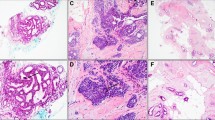Abstract
Purpose
To describe a training program in percutaneous core needle biopsy implemented in conjunction with a breast cancer research collaboration between the University of Michigan (UM) and the Komfo Anokye Teaching Hospital (KATH), Kumasi, Ghana.
Methods
In July 2007 a Ghana-based training program for performance of core needle biopsy was jointly coordinated by the UM and KATH principal investigators (L.N. and B.A.). This course required less than 1 week for implementation.
Results
Following the training course (July 2007 through August 2008), 82 core needle biopsies of breast masses were performed at KATH. Of these, 56 had tissue specimens available for review at UM for comparison with KATH primary pathology reports. Forty-six of the 56 UM-reviewed cases (82%) had a KATH diagnosis of breast cancer; UM pathology review was in agreement with the cancer diagnosis in all 46 cases (100%). Ten of the 56 UM-reviewed cases (18%) had a KATH diagnosis of benign fibroadenoma/fibrocystic breast tissue; UM review was concordant in all ten cases (100% concordance for benign lesions). For the remaining 26 procedures we were unable to retrieve either the KATH pathology report or tissue blocks for UM review.
Discussion
The design and implementation of appropriate diagnostic biopsy programs is important for delivery of high-quality, efficient breast cancer care in developing nations. This study demonstrates a successful 1-week training program in percutaneous core needle biopsy for a multidisciplinary group of physicians. Further work is needed for similar programs to accurately identify and classify breast cancer internationally.
Similar content being viewed by others
References
Newman LA, Kuerer HM. Advances in breast conservation therapy. J Clin Oncol. 2005;23:1685–97.
Edge S, Ottesen R, Lepisto E, et al. Surgical biopsy to diagnose breast cancer adversely affects outcomes of breast cancer care: finding from the National Comprehensive Cancer Network, 2005 San Antonio Breast Cancer Symposium Abstract No. 12. San Antonio, TX; 2005.
Stark A, Kleer C, Martin IK, et al. African ancestry and higher prevalence of triple negative breast cancer: findings from an international study. Cancer. 2010;116:4926–32.
Crowe JP Jr, Rim A, Patrick RJ, et al. Does core needle breast biopsy accurately reflect breast pathology? Surgery. 2003;134:523–6 (discussion 526–8).
Pace ME, Berg WA. The role of large core needle biopsy in locally advanced breast cancer. Md Med J. 1997;46:419–23.
Gruber R, Bernt R, Helbich TH. Cost-effectiveness of percutaneous core needle breast biopsy (CNBB) versus open surgical biopsy (OSB) of nonpalpable breast lesions: metaanalysis and cost evaluation for German-speaking countries. Rofo. 2008;180:134–42.
Nalwoga H, Arnes JB, Wabinga H, et al. Expression of aldehyde dehydrogenase 1 (ALDH1) is associated with basal-like markers and features of aggressive tumours in African breast cancer. Br J Cancer. 102:369–75
Nalwoga H, Arnes JB, Wabinga H, et al. Frequency of the basal-like phenotype in African breast cancer. APMIS. 2007;115:1391–9.
Bird PA, Hill AG, Houssami N. Poor hormone receptor expression in East African breast cancer: evidence of a biologically different disease? Ann Surg Oncol. 2008;15:1983–8.
Huo D, Ikpatt F, Khramtsov A, et al. Population differences in breast cancer: survey in indigenous african women reveals over-representation of triple-negative breast cancer. J Clin Oncol. 2009;27:4515–21.
Fregene A, Newman LA. Breast cancer in sub-Saharan Africa: how does it relate to breast cancer in African-American women? Cancer. 2005;103:1540–50.
Ghana Embassy webpage. http://www.ghanaembassy.org/. Accessed 4 Nov 2009.
http://en.wikipedia.org/wiki/Ghana. Accessed 4 Nov 2009.
Globocan. Globocan 2000: cancer incidence, mortality and prevalence worldwide (ed version 1.0). Lyon: IARC Press; 2001.
Martin IK, Awuah B, Newman LA. Guide for investigators conducting international cancer research involving developing nations. Cancer. 2010;116:1396–9.
Acknowledgement
The authors gratefully acknowledge financial support from the University of Michigan Comprehensive Cancer Center, the Global REACH Program, and Susan G. Komen for the Cure, for making this training program and its evaluation possible.
Author information
Authors and Affiliations
Corresponding author
Rights and permissions
About this article
Cite this article
Awuah, B., Martin, I.K., Takyi, V. et al. Implementation of a Percutaneous Core Needle Biopsy Training Program: Results from the University of Michigan–Komfo Anokye Teaching Hospital Breast Cancer Research Partnership. Ann Surg Oncol 18, 957–960 (2011). https://doi.org/10.1245/s10434-010-1422-4
Received:
Published:
Issue Date:
DOI: https://doi.org/10.1245/s10434-010-1422-4



